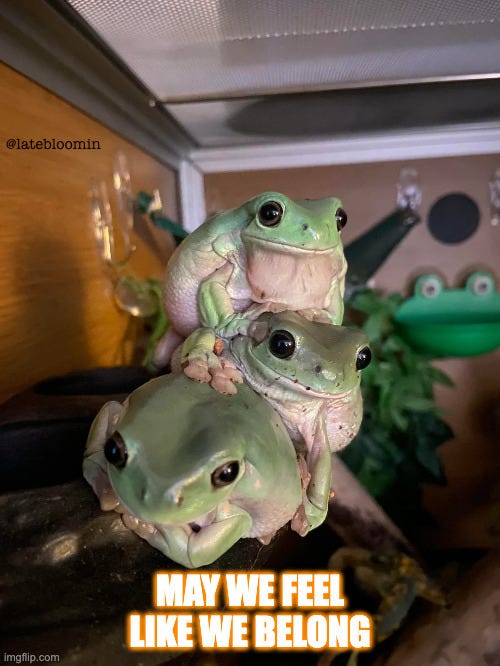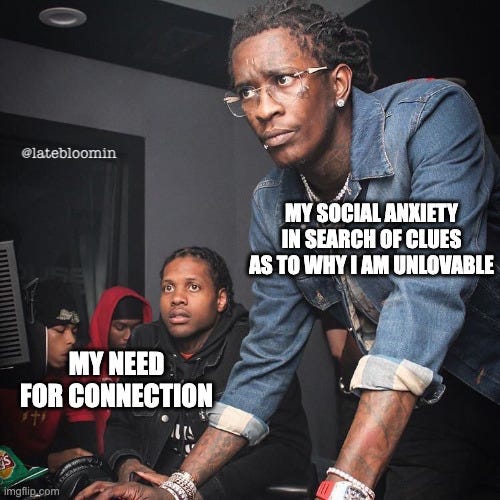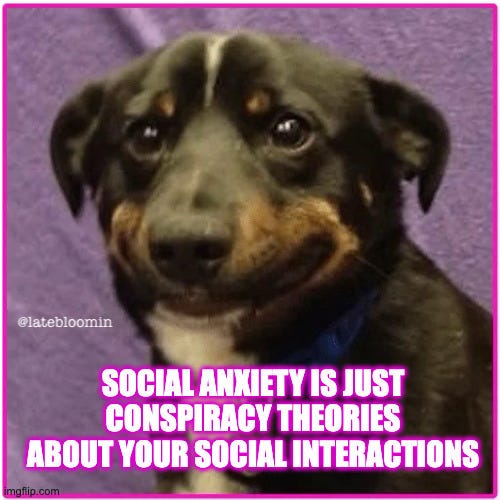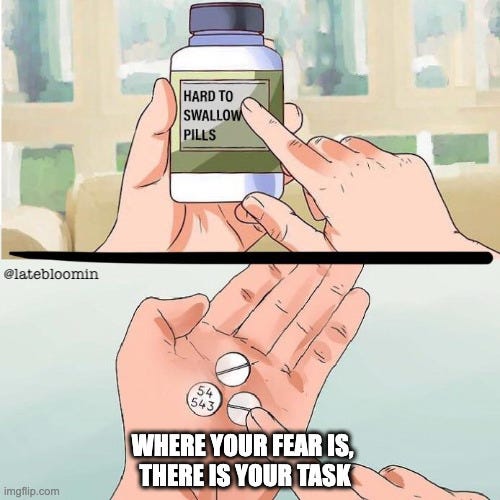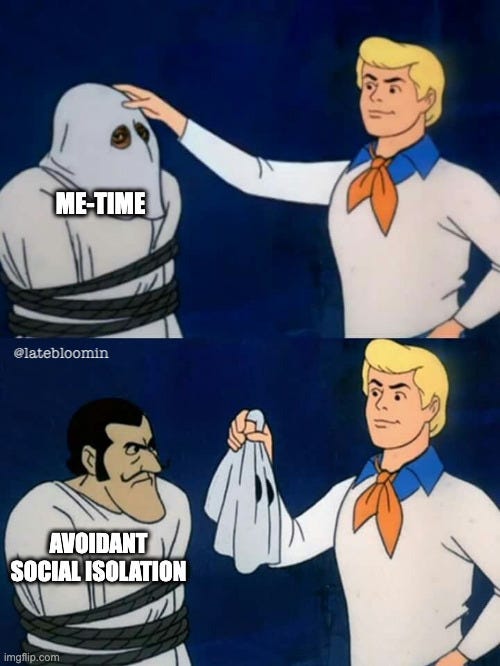finding belonging - a shy boy's journey through social phobia
why social anxiety can feel so damn intense (it's our caveman mind), how to find the courage to connect & on the role of love as an antidote to fear
“May I feel like I belong."
I come back to this mantra often in my loving-kindness meditations (my metta practice) and every time I hear or speak it, something stirs in me. I can feel the weight of those words land in my body, they shake my foundation. Probably my deepest wish is to belong, to feel accepted and loved the way I am. It’s no mystery why: belongingness is one of the most deeply ingrained human needs.
The need to belong is so fundamental that babies can actually die from isolation, from a lack of physical touch. It’s simply a fact that we as human beings are social animals. We are hard-wired through evolution to seek connections. (cc to all lone wolves who claim they don’t need anyone: humans need connection and so do you babe)
For most of human history, being part of a group wasn’t just cute — it was essential for our survival. Which is why social rejection can still feel life-threatening when it’s (potentially) happening. For our ancestors, it literally was life-threatening to get excluded from their group. That’s the gist with evolution: our bodies and brains adapted over millennia to meet the demands of their environment, and now we’re left navigating a completely different world with the same old wiring. It’s why seemingly mundane social interactions can feel so damn scary. Like when I don’t receive a reply after sending a slightly vulnerable text, and my nervous system reacts as if my life is endangered. Or when I have to introduce myself in a group circle and my anxiety is acting up like I’m about to jump off a cliff. Please relax dear nervous system, we are not out in the wilderness anymore, there is no lion attacking us, we just have to introduce ourselves.
Luckily, being aware of these evolutionary links is the first step towards healing. It makes it easier to be gentle with ourselves and to see that we don’t have to believe our anxious thoughts. It may feel life-threatening, but it’s actually just our caveman mind believing we’re constantly fighting for our lives. We can let go, and we can find ways to regulate our nervous system, we don’t have to act upon our anxiety.
shy boy struggles
As a teenager, I really struggled to make friends and find connection outside of my family. Fortunately, I grew up in a big family, so I wasn’t fully isolated, always having someone to play with. Still, I often felt lonely and longed for friendships.
The problem was: I was extremely shy. Just the thought of meeting new people or to speak in front of class absolutely terrified me. I hardly ever opened my mouth; my main goal in school was simply to stay invisible. It took me a long time to learn how to work through my social phobia, which is why I want to share what I’ve discovered on my journey toward finding the courage to connect. So here we go:
anxiety = fake news
One of my fav quotes to see through the irrational nature of anxiety: Anxiety is just conspiracy theories about yourself.
An updated version for social anxiety would be: Social anxiety is just conspiracy theories about your social life.
One example: I want to reach out to a friend I’ve lost touch with. This is motivated by love: I want to re-establish our connection. But then my fear sets in. My social anxiety chimes in: “What if they don’t want to hear from you? What if they are actually relieved & happy that you don’t have a close connection anymore? Maybe I should better not reach out, what if they have new friends and will be annoyed by my message? Maybe they already forgot me?” This is a conspiracy theory about our friendship. It’s fake news, we need some fact-checking. Or better yet, we can skip the investigation, take a shortcut and go straight to the end-goal: returning to love. All other thoughts and scenarios are motivated by fear, by the ego. There are no benefits from pursuing these thoughts - no hidden truth waiting to be uncovered. The sooner we recognise this, the sooner we will be at peace.
where love is absent, fear sets in
Love really is one of the antidotes to (social) anxiety. Where love is absent, fear sets in. I learned this lesson from one of my fav books: A Return to Love by Marianne Williamson.
exposure therapy = effective method to treat anxiety
One of the most effective ways to treat anxiety is through exposure therapy — slowly and gradually facing our fears. Anxiety disorders are so tricky because naturally we avoid what we fear and thus don’t get any exposure. It creates a vicious cycle: the more we avoid, the scarier the unknown becomes. We fear what we don’t know.
That’s why facing our fears is one of the most direct paths to overcoming them. Exposure therapy works so well, simply by revealing how irrational our fears often are. This can be done in a therapeutic setting, but we can also create small exposure moments in everyday life. Like practicing small talk with strangers (f.e. cashiers in the supermarket), saying hi to a neighbour, or by simply holding eye contact and offering a smile. Exposure therapy is avoidance turned on its head. It’s a helpful rule of thumb for life in general: let your fear be your guide. As Jung said: “where your fear is, there is your task.”
a shift in perspective
If we apply this formula of confronting our fears to social anxiety, it calls for a major shift in how we view social interaction — not as something we avoid, but as something that we actively seek out. This is an important reframing. As social phobics, we’ve often internalised that social interactions are by nature stressful, draining, scary (or whatever negative attributes fit the scheme). We are convinced we suck at socialising or that we as introverts are simply not built for connection. We assume we’re socially awkward and that everyone else will see us that way too.
What I try to do is re-label social interaction as something positive, something joyful, for what I can be grateful for instead of constantly dreading it. That shift may seem mundane, but it actually works. Life as someone with social phobic tendencies feels like constant exposure therapy — constant practicing, constant unlearning. But the good news is: it gets easier over time. With each small interaction, the next one feels a little less daunting.
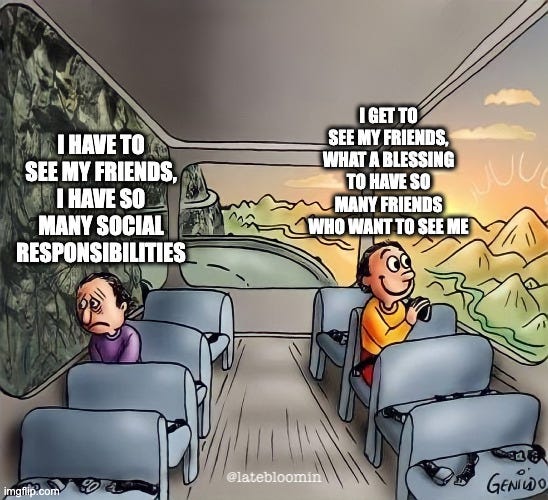

unlearning the reflex to avoid interaction
I’ve come a long way on my social journey, yet I’m still in the process of unlearning some of the stubborn beliefs and conditioned anxious responses. Almost every text message I receive, every invitation that comes my way, every anticipated social interaction at first still creates distress.
My initial reflex is to choose avoidance — thoughts of potentially cancelling pop into my head. There is always a strong pull to escape, to retreat into my comfort zone, to avoid social confrontation. But thankfully, I’ve learned not to give in to that temptation.
And I’m consistently rewarded for it — through fulfilling feelings of connection, of belonging, of community and simply by feeling proud of facing my fears again and again. It fills me with pride to witness how far I’ve come from my early social phobic days to someone who is now seen as a social person, as someone for whom socialising seems to be natural.
That’s why it’s so important to share stories like this. We’re not born doomed to a fixed destiny. Yes, we may have some tendencies - like introvertedness - but that doesn’t mean we’re forever trapped in social avoidance and isolation. Honouring our introverted needs is valid and necessary, but likewise I very much enjoy my newfound outgoing personality traits.
Sometimes it still feels surreal when I find myself approaching people and doing small talk, or when I speak in front of a group. Things that always seemed completely out of reach for my social phobic ass. My life felt doomed to stay lonely. This is the key message I want to emphasise: we can change, we are not doomed, we can find connection, we can find belonging.
We don’t have to pursue our anxious thoughts, there is no hidden truth buried there, we are allowed to let go of them.
We can return to love. We can return to trust.
We are safe. We are loved.
We belong.






